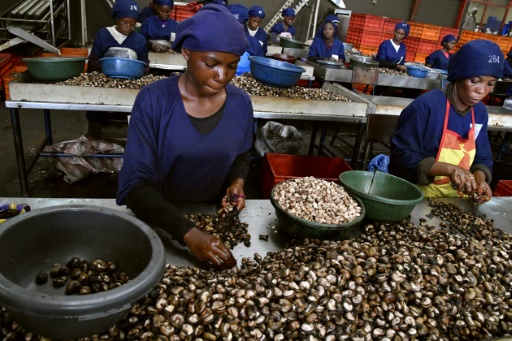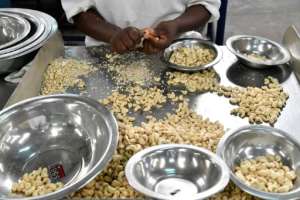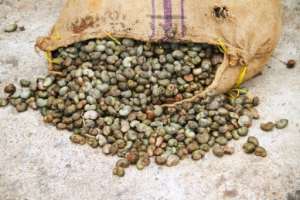
[ad_1]
Cashews are big business in Côte d’Ivoire, the world’s largest producer, and the country is waging an increasingly intense campaign to stop the smuggling of the nut known there as “gray gold”.
The West African nation has tightened its laws to punish those caught sneaking over its borders and is trying to educate producers about the damage illegal trade has on the economy.
Between 150,000 and 200,000 tonnes of Ivorian cashews were illicitly sold last year to neighboring countries, including Ghana and Burkina Faso, against nearly 100,000 tonnes the year before, according to official figures.
“Each year, the production leakage is a big concern,” said Adama Coulibaly, director of the Ivorian Coton-Anacarde Council, which manages the sector.
“We are trying to do everything possible to limit the departure of our wealth to neighboring (countries),” he told AFP.
In 2020, a government ordinance repealed and replaced a previous one from 2018, deemed “ineffective” in combating the smuggling of both cashews and cocoa, of which Côte d’Ivoire is also the world’s largest exporter.
“We have more wiggle room against those who hurt the economy,” Coulibaly said, “because every kilogram (2.2 pounds) that comes out is a loss to the national economy and to the industry.”
– ‘We have to hit hard’ –
Those found guilty of smuggling now face up to 10 years in prison, a fine of 50 million CFA francs ($ 92,000) and seizure of their harvest.
“We have to hit hard, where it hurts, in the wallets” of those behind the illegal trade, said Coulibaly, who believes the majority of smuggling barons are based in neighboring countries.
Without disputing the value of the new punitive measures, many scholars argue that a good price paid to producers for a better quality product would be the best way to prevent illegal trade.
 The kernel of the cashew nut is widely used in cooking and cosmetics, while the resin in its shell is suitable for a surprising range of industrial uses. By ISSOUF SANOGO (AFP / File)
The kernel of the cashew nut is widely used in cooking and cosmetics, while the resin in its shell is suitable for a surprising range of industrial uses. By ISSOUF SANOGO (AFP / File) “There is a well-organized network,” said a grower from Ferkessedougou, the country’s main cashew region in the far north, asking not to be named as he disclosed cross-border ties with Burkina Faso.
“The prices set here between 400 and 500 CFA francs (74 to 92 US cents) are not respected, while we manage to sell between 800 and 1,500 CFA francs in Burkina.”
Bags of cashews are transported along the many tracks that cross the porous border.
“Côte d’Ivoire is now paying for the poor quality of its production,” said Klotioloma Soro, coordinator of the National Rural Development Support Agency.
“Exporters have offered (producers) lower purchase prices than those paid in neighbors like Ghana, where the quality is better.”
– Awareness campaign –
A public awareness campaign is at the heart of efforts to combat human smugglers.
Last week, in the northern regions, the government instructed “the services in charge of border protection … to take all measures to fight against the loss of nuts by land borders”.
The senior government official in these regions, the prefect, now heads an “awareness committee” made up of agricultural buyers, police and paramilitary gendarmes, as well as the military, with instructions to suppress illicit activities.
 Cashews are sometimes called “gray gold” because they are a big deal in Côte d’Ivoire. By Mohamed Bio (AFP / File)
Cashews are sometimes called “gray gold” because they are a big deal in Côte d’Ivoire. By Mohamed Bio (AFP / File) In addition to illegal smuggling, the 350,000 producers of the Ivorian cashew nut sector are also facing a major challenge in transforming their activity.
While Africa accounts for around 90 percent of global cashew production, only 10 percent of this production is processed locally for by-products.
South America and particularly Asia process not only their own cashews, but also those imported from Africa – often re-exporting them afterwards.
The kernel of the nut is widely used in cooking and cosmetics, while the resin in its shell is suitable for a surprising range of industrial uses. The shell of the raw nut even contains a fluid used as a fluid for aircraft brake systems.
Source link